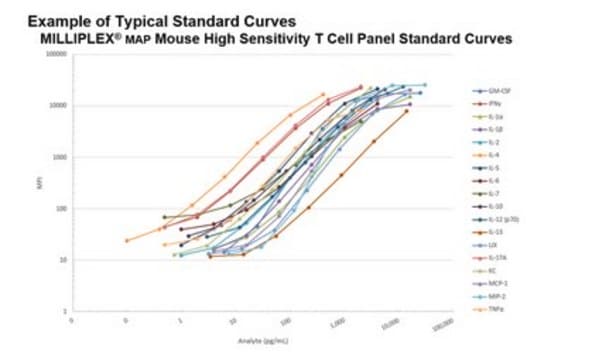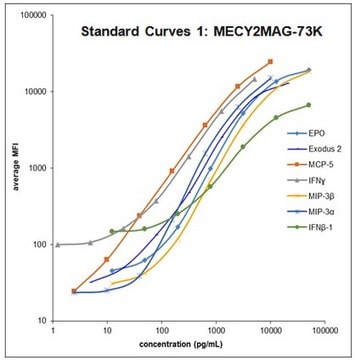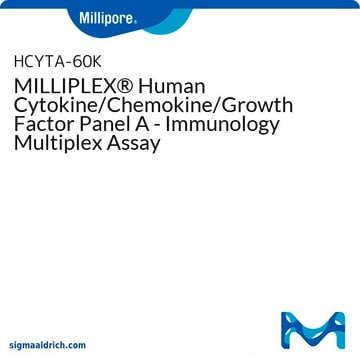MTH17MAG-47K
MILLIPLEX® Mouse TH17 Magnetic Bead Panel - Immunology Multiplex Assay
Simultaneously analyze multiple Th17 cytokine and chemokine biomarkers with the Th17 Bead-Based Multiplex Assays using the Luminex technology, in human serum, plasma and cell culture samples.
Synonym(s):
Luminex® Mouse Immunology Panel, Millipore Mouse Immunology Panel, Mouse Immunology Protein Multiplex Assay
About This Item
Recommended Products
Quality Level
species reactivity
mouse
manufacturer/tradename
Milliplex®
assay range
linearity: 111.0%
(1:04)
linearity: 113.1%
(1:08)
standard curve range: 1.5-1,500 pg/mL
(IL-4)
standard curve range: 10-10,000 pg/mL
(IL-17F)
standard curve range: 127-130,000 pg/mL
(IL-28B)
standard curve range: 15-15,000 pg/mL
(IL-1β)
standard curve range: 2.4-2,500 pg/mL
(IL-22)
standard curve range: 20-20,000 pg/mL
(IL-10, IL-12(p70), & IL-21)
standard curve range: 3.4-3,500 pg/mL
(TNFα)
standard curve range: 34-35,000 pg/mL
(GM-CSF & IL-15)
standard curve range: 342-350,000 pg/mL
(IL-23)
standard curve range: 39-40,000 pg/mL
(IL-13 & IL-17A)
standard curve range: 4.9-5,000 pg/mL
(IL-5)
standard curve range: 488-500,000 pg/mL
(TNFβ)
standard curve range: 49-50,000 pg/mL
(CD40L IL-31 & MIP-3α)
standard curve range: 586-600,000 pg/mL
(IL-17E/ IL-25)
standard curve range: 6.9-6,000 pg/mL
(IL-2)
standard curve range: 7.8-8,000 pg/mL
(IFNγ & IL-6)
standard curve range: 78-80,000 pg/mL
(IL-33)
standard curve range: 879-900,000 pg/mL
(IL-27)
technique(s)
multiplexing: suitable
detection method
fluorometric (Luminex xMAP)
shipped in
wet ice
General description
Panel Type: Cytokines/Chemokines
Specificity
There was no or minimum cross-reactivity between the antibodies and any other analytes in the panel (see details in assay protocol).
Application
- Analytes: CD40 Ligand, GM-CSF, IFN-γ, IL-1β, IL-2, IL-4, IL-5, IL-6, IL-10, IL-12 (p70), IL-13, IL-15, IL-17A, IL-17E/IL-25, IL-17F, IL-21, IL-22, IL-23, IL-27, IL-28B, IL-31, IL-33, MIP-3α/CCL20, TNF-α, TNFβ
- Recommended Sample type: serum, plasma or tissue/cell lysate and culture supernatant
- Recommended Sample dilution: neat
- Assay Run Time: overnight or one day
- Research Category: Inflammation & Immunology
Features and Benefits
Storage and Stability
Other Notes
Legal Information
Disclaimer
Signal Word
Danger
Hazard Statements
Precautionary Statements
Hazard Classifications
Acute Tox. 4 Dermal - Acute Tox. 4 Inhalation - Acute Tox. 4 Oral - Aquatic Chronic 2 - Eye Dam. 1 - Skin Sens. 1 - STOT RE 2
Target Organs
Respiratory Tract
Storage Class Code
10 - Combustible liquids
Certificates of Analysis (COA)
Search for Certificates of Analysis (COA) by entering the products Lot/Batch Number. Lot and Batch Numbers can be found on a product’s label following the words ‘Lot’ or ‘Batch’.
Already Own This Product?
Find documentation for the products that you have recently purchased in the Document Library.
Related Content
See how multiplexing the inflammation signaling pathway with MILLIPLEX® inflammation assays or cell signaling assays can help researchers bridge the gap between immunology and cell signaling, including investigating T cell signaling, Th Cell differentiation, inflammatory response signaling, and sepsis signaling.
See how multiplexing the inflammation signaling pathway with MILLIPLEX® inflammation assays or cell signaling assays can help researchers bridge the gap between immunology and cell signaling, including investigating T cell signaling, Th Cell differentiation, inflammatory response signaling, and sepsis signaling.
See how multiplexing the inflammation signaling pathway with MILLIPLEX® inflammation assays or cell signaling assays can help researchers bridge the gap between immunology and cell signaling, including investigating T cell signaling, Th Cell differentiation, inflammatory response signaling, and sepsis signaling.
See how multiplexing the inflammation signaling pathway with MILLIPLEX® inflammation assays or cell signaling assays can help researchers bridge the gap between immunology and cell signaling, including investigating T cell signaling, Th Cell differentiation, inflammatory response signaling, and sepsis signaling.
Our team of scientists has experience in all areas of research including Life Science, Material Science, Chemical Synthesis, Chromatography, Analytical and many others.
Contact Technical Service











